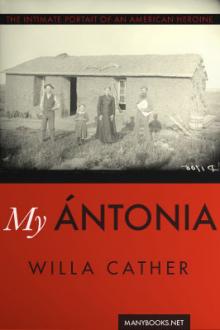My Ántonia by Willa Cather (books for new readers .TXT) 📕

- Author: Willa Cather
- Performer: -
Book online «My Ántonia by Willa Cather (books for new readers .TXT) 📕». Author Willa Cather
hewas a restless, headstrong girl, even then, who liked to astonish herfriends. Later, when I knew her, she was always doing somethingunexpected. She gave one of her town houses for a Suffrage headquarters,produced one of her own plays at the Princess Theater, was arrested forpicketing during a garment-makers' strike, etc. I am never able to believethat she has much feeling for the causes to which she lends her name andher fleeting interest. She is handsome, energetic, executive, but to meshe seems unimpressionable and temperamentally incapable of enthusiasm.Her husband's quiet tastes irritate her, I think, and she finds it worthwhile to play the patroness to a group of young poets and painters ofadvanced ideas and mediocre ability. She has her own fortune and lives herown life. For some reason, she wishes to remain Mrs. James Burden.
As for Jim, no disappointments have been severe enough to chill hisnaturally romantic and ardent disposition. This disposition, though itoften made him s
Free e-book «My Ántonia by Willa Cather (books for new readers .TXT) 📕» - read online now
Similar e-books:





Comments (0)